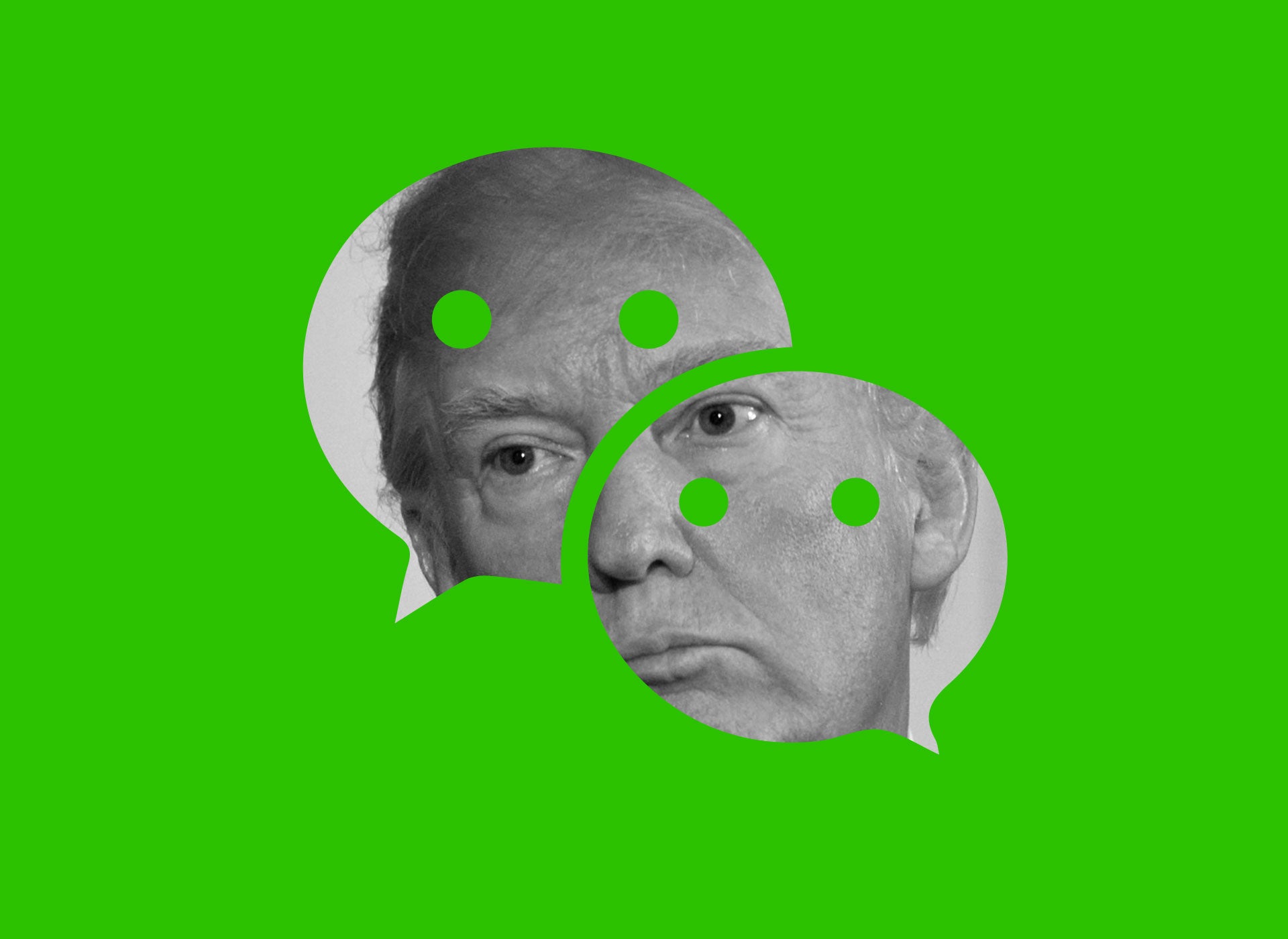
On Thursday evening, US President Donald Trump signed two executive orders to ban US companies from engaging in business transactions with TikTok parent company ByteDance and Tencent-owned WeChat.
The move, although met with surprise by many, is the latest in the ongoing US-China trade war, which has recently seen TikTok become the next battleground.
However, while the TikTok ban is an evolution of Trump’s ongoing campaign against the company, and likely a ploy to force the sale of the US arm to Microsoft, the ban of WeChat is more unexpected.
The world’s largest standalone mobile app, WeChat serves as an all-in-one social media, messaging and mobile payments platform, boasting over 1 billion monthly active users. It is the primary social media app in China, but also has users around the world – including in the US.
Trump ban: The executive order blocking WeChat
The executive order “Addressing the Threat Posed by WeChat” justifies the ban on the basis that the data it collects could be accessed by the Chinese government – although there has been no proof this has happened – and therefore it threatens “the national security, foreign policy, and economy of the United States”.
Set to come into force on 20 September, it bans “any transaction that is related to WeChat by any person, or with respect to any property, subject to the jurisdiction of the United States, with Tencent Holdings, Shenzhen, China, or any subsidiary of that entity”.
The twin WeChat and TikTok bans have prompted outrage from some quarters, with Daniel Castro, vice president of the Information Technology and Innovation Foundation, accusing the US of “creating a double standard”.
“There is no security justification for banning an app merely because it is owned by a Chinese company,” he said. “Allegations of security risks should be backed by hard evidence, not unsubstantiated innuendo.”
The phrasing of the WeChat ban has also sparked considerable confusion and concern, in no small part because Tencent has made numerous investments in the US tech industry over the past few years. It holds shares in numerous US gaming companies, including Riot Games and Epic Games, as well as content aggregator Reddit and chat platform Discord.
The announcement, therefore, was met with initial outrage from the gaming community, although the US government did then confirm that, despite its phrasing, the executive order only impacts transactions related to WeChat, not the wider companies Tencent has holdings in.
However, while this may appear to simply be an attempt to ban the WeChat app for users, there are still considerable concerns and questions for many companies that use or are impacted by the app.
US tech industry impact
One group that could be particularly hard-hit by the WeChat ban is Silicon Valley companies with Chinese operations.
This includes US companies that have set up operations in China, either to reach the local market or make use of the country’s manufacturing capabilities – a list that includes Microsoft, Google, Apple and IBM.
Apple could be particularly badly hit by this, as it may require the company to delist WeChat from its app stores, including in China. And given that WeChat is the fifth most popular free app on the Chinese app store – just behind TikTok – that could prove to be devastating for a company that in Q1 2020 made 15% of its revenue from the country.
It may also significantly affect Chinese companies that opted to move their global headquarters to the US to better access international markets, or set up offices there. This is common practice among Chinese tech startups, and for those that regularly communicate with their Chinese counterparts, WeChat Work – Tencent’s answer to Slack – is a commonly used communication and collaboration tool, yet will be effectively banned under the executive order.
This could create considerable challenges for productivity, but there are also problems afoot for companies that use WeChat’s platforms to promote their products and services. And what workarounds – if any – will be available, remains to be seen.
As a result, Mark Tibbs, cyber intelligence director at Mishcon de Reya, believes there is likely to be “significant backlash” in response to the ban of transactions relating to both TikTok and WeChat.
“Considering the scale of usage of both apps in the US and globally, these executive orders will undoubtedly cause substantial impacts for both users, communities and in some instances, businesses which rely on the apps to market goods and services, or promote their brands,” he said.
“The orders may also stimulate the development of various technical workarounds by users to be able to use the apps, and indeed the development of similar apps to fill the niche which will exist. Larger US technology companies will likely see the announcements as an opportunity for future acquisition or launching and promotion of their own alternatives.”
Companies doing business with Tencent
While there has been a clarification that the executive order only relates to WeChat, there is still a considerable grey area here when it comes to defining what does and doesn’t relate to the app.
If, for example, a company provides services to aid the development of new offices to host WeChat employees, will this be counted by the Trump administration?
While the answer may be no, as long as they don’t actually use the WeChat app to work with the company, this has not been clarified, and the phrasing of the executive order makes it entirely plausible that this could be deemed unacceptable under the ban.
And this isn’t a hypothetical example either: US architectural firm NBBJ recently unveiled its designs for Net City, a striking 2 million square metre masterplan in Shenzhen, China, for Tencent, which is designed to host much of its workforce in the city. If the WeChat ban extends to the teams behind the app, this project could be put in jeopardy.
A potential backlash in China and beyond
As the ban of TikTok and WeChat are the latest moves in a long-running trade war between the US and China, it would be naïve to think that China will not at least consider retaliating. And that could have dire implications for businesses in the US.
“Another potential reaction to these orders is that of Chinese retaliatory action against US private companies which trade in China or rely heavily on Chinese production in their supply chains,” said Tibbs.
“As such, we might expect to see similar Chinese action to restrict trade with US entities, particularly those involved in technology.”
This could be particularly damaging to companies such as Apple that rely on Chinese manufacturing for their electronics, doing serious harm to the US economy at a time when it is already is significant jeopardy.
However, there are also potential issues in other countries. The user data collected by WeChat and TikTok is extremely similar in scope to that collected by US social media platforms such as Facebook. As a result, it may bring into sharper focus the already growing concerns surrounding privacy and social media.
“Whether or not you believe that Trump is right to ban US companies from transacting with Tencent and Bytedance, this unfolding controversy clearly adds to the uneasiness surrounding social media platforms globally,” said Danny Bluestone, CEO of Cyber-Duck.
“Twitter and Facebook have proven their inability to curb the spread of misinformation and hate speech and recent ad boycotts from major advertisers send a message from the business community that things need to change.
“With the major US platforms, the problems are there for all to see in the content that is posted and distributed; with the Chinese platforms, there is tension around government regulation and interference. Either way, clear signals from governments to regulate big tech indicate that the value of social media to both users and enterprise partners is diminishing.”
While it may seem unlikely, it is not beyond the realm of possibility that regulators in other countries, sick of trying to reign in data handling by such companies, will use the WeChat ban as precedent to enact similar orders in their own countries.
“American tech companies stand to lose significant global market share if other countries follow a similar standard and block US tech companies from their markets because of concerns about US government surveillance,” said Castro.
There are also potential issues for the UK, which ultimately banned Huawei following US pressure, but may struggle to do the same if the Trump administration raises concerns about WeChat.
The UK government has a partnership with Tencent, signed in 2018 to strengthen post-Brexit ties with China. And if Trump continues his efforts, it may once again be forced to make a choice between the two countries.
Read more: Clean Network is a messy roadmap for a digital wall with China







